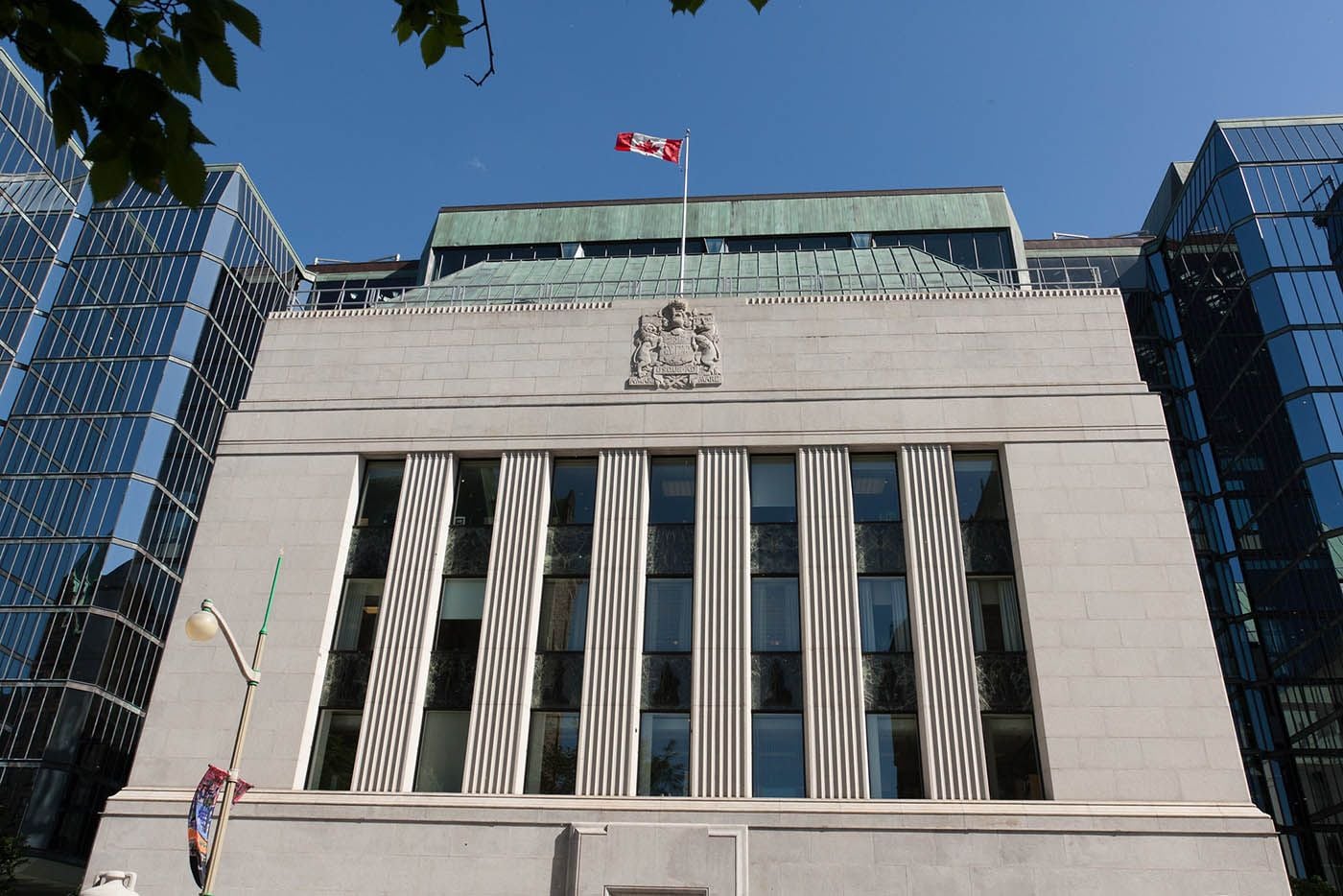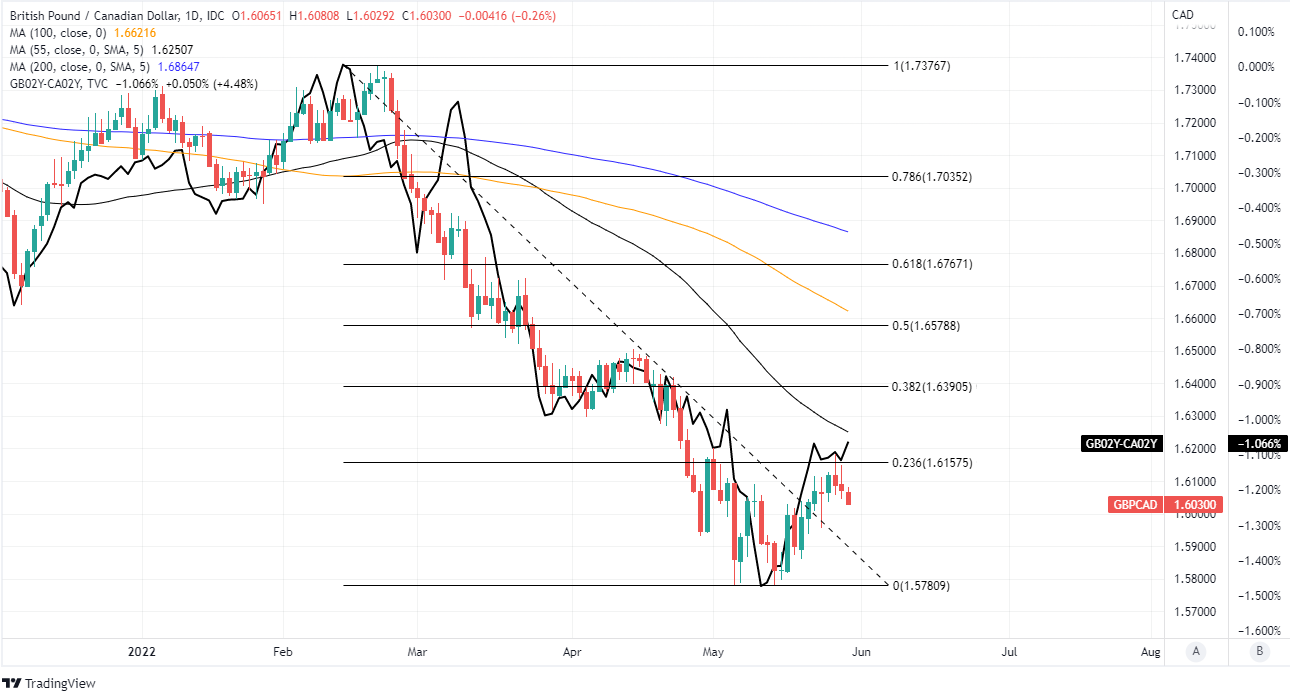GBP/CAD Week Ahead Forecast: Retest of 1.6157 Possible
- Written by: James Skinner
-
- GBP/CAD still struggling with resistance near 1.6157 on charts
- Could attempt recovery if BoC hints of slower rate rises ahead
- Characterisation of economic outlook & inflation risks both key

The Bank of Canada, Ottawa. Image reproduced under CC licensing conditions
The Pound to Canadian Dollar rate opened the new week on its back foot but could attempt to retest a nearby technical resistance barrier around 1.6157 overhead on the charts if the Bank of Canada (BoC) signals on Wednesday that a slower pace of interest rate rises may be likely up ahead.
BoC rate setters didn’t mince any words when making clear in April that Canadian inflation is unlikely to return to its target without higher interest rates and this is a part of why financial markets assume that the bank is almost certain to lift its cash rate by a further 0.5% to 1.5% this Wednesday.
“We also anticipate a relatively hawkish policy statement, considering that growth and inflation continue to run well ahead of what the BoC expected in its Apr MPR,” says Shaun Osborne, chief FX strategist at Scotiabank.
“Recall that the MPR anticipated inflation of 5.8% in Q1 and GDP growth of 3% (SAAR). March CPI was nearly a point above the BoC forecast while GDP growth is tracking a little under 5%, according to our Scotia Economics colleagues,” Osborne and colleagues said on Friday.
Wednesday’s move would be a second consecutive increase of 0.5% for the benchmark of borrowing costs, a larger than usual increment, and would also mark a substantial reversal of the large coronavirus-induced cut from 1.75% that was announced during the early months of 2020.
An increase to 1.5% would also lift the cash rate to within close reach of the coveted ‘neutral’ range, believed to be between 2% and 3% and a potentially natural point at which the BoC could either pause its tightening cycle or simply look to move forward at a more leisurely pace.

Analysts do broadly disagree, however, while markets continue pricing-in a series of further large 0.5% increases in the cash rate for the months ahead and in part due to Canadian inflation figures that have continued to illustrate building price pressures in the economy.
“The Bank will have to sound hawkish. After all, non-standard 50bp hikes don’t happen every day, particularly back-to-back. Moreover, inflation has continued to surprise to the upside. However, any admission that the housing market is already responding to higher interest rates should also be seen as an admission that excess demand is about to become less excessive,” says Andrew Grantham, an economist at CIBC Capital Markets.
“That is one of the key reasons why we think that, after another 50bp hike in July, the pace of hikes will slow down, and the Bank won’t need to take rates any higher than the 2.5% mid-point of its neutral band to achieve 2% inflation sometime in 2023,” Grantham and colleagues said on Friday.
While Canadian inflation rates have shown little sign of an immediate slowdown, CIBC has noted that housing transaction volumes are already falling in response to higher interest rates and Statistics Canada said just last week that retail sales volumes fell by 1% in March and rose by only 0.2% for the first quarter overall.
The latter may have been a response to increased prices and to the extent that it was, it could indicate that an easing of domestically-generated inflation pressures is likely to be seen in the months ahead, which would likely have implications for the BoC’s interest rate stance.
Source: CIBC Capital Markets.
“We are keeping a close eye on things like housing activity, supply chain challenges and consumer spending. We are continuously adjusting our modelling and our forecasts,” BoC Deputy Governor Toni Gravelle said in a May 12 address before the Association des économistes québécois.
Much of the market’s attention will likely be centred on the BoC’s characterisation of the Canadian economic outlook as well as any other hints about the likely path ahead for its interest rate during the months ahead.
The decision is the highlight of the week for the Canadian Dollar, although a busy U.S. economic calendar will also be an important influence on USD/CAD, which is sometimes positively correlated with GBP/CAD.
“Arguably, the more critical driver rests on the global side, where risk sentiment (and the broad USD) maintain their market grip. As a result, we don't think the expected 50bp BoC hike will offer much excitement for markets, especially as USDCAD sits close to our highfrequency fair value estimates of 1.28,” says Mark McCormick, global head of FX strategy at TD Securities.
“We think the most important driver is that CAD is the most overbought G10 currency on our dashboard, leaving it vulnerable to a shift in the market narrative. In other words, if the USD falls, then CAD is likely to follow, especially on the crosses,” McCormick and colleagues said on Friday.

